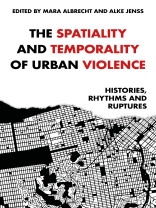This edited volume asks how the city, with its spatial and temporal configuration and its rhythms, produces and shapes violence, both in terms of the built environment, and through particular ‘urban’ social relations. The book builds on the insight that violence itself is a spatiotemporal practice with generative capacities, which produces and transforms urban space and time in the long turn, also through the impact of memory. The analytical categories of space and time must be thought as inextricably linked with each other. Expanding this fundamental conceptual idea offers fresh perspectives on urban violence. The book unites case studies on different world regions and historical periods , and thus challenges assumed binaries of cities the global North and South, the past and present.
Cuprins
Foreword
Niall Ó Dochartaigh
Introduction: Sites of violence, entangled in space and time
Mara Albrecht and Alke Jenss
Part I Space-time regimes and regulations: Changing forms of urban violence
1 Revolution lost and found: Collective actions, fears, and violently contested space-time regimes in Hamburg and Seattle (c. 1916–20)
Klaus Weinhauer
2 From riots to massacres: How space and time changed urban violence in Jerusalem, 1920-29
Roberto Mazza
3 Resisting a hegemonic spatiotemporal order: Hindu nationalist violence and subterranean agency in Ahmedabad
Shrey Kapoor
Part II Rhythms and spatiotemporal dynamics: Structuring effects on and of practices of urban violence
4 Six temporalities of urban violence: A comparative perspective on El Salvador and Jamaica
Hannes Warnecke-Berger
5 Disrupting the rhythms of violence: Anti-port protests in the city of Buenaventura
Alke Jenss
6 The urban pulse of violence: Spatiotemporal patterns in the riots in Belfast and Jerusalem during the era of the British Empire
Mara Albrecht
Part III Memories and (religious) imaginations: Representations of urban violence
7 Beirut’s violence palimpsest: Urban transformations, mnemonic spaces and socio-temporal practices
Christine Mady
8 ‘Humiliation Days’ – Remembering, repeating and expecting urban violence in British Malaya and the Dutch East Indies
Andreas Bolte
9 Counter-mapping the divided city: Topographies of violence and the religious imagination in urban Brazil
Christian Laheij
Epilogue: Rhythms and space-time of violence in and of the city
Jutta Bakonyi
Despre autor
Mara Albrecht is Postdoctoral Research Associate at the University of Erfurt Alke Jenss is Senior Researcher and Head of the Cluster Contested Governance at the Arnold Bergstraesser Institute, Freiburg












